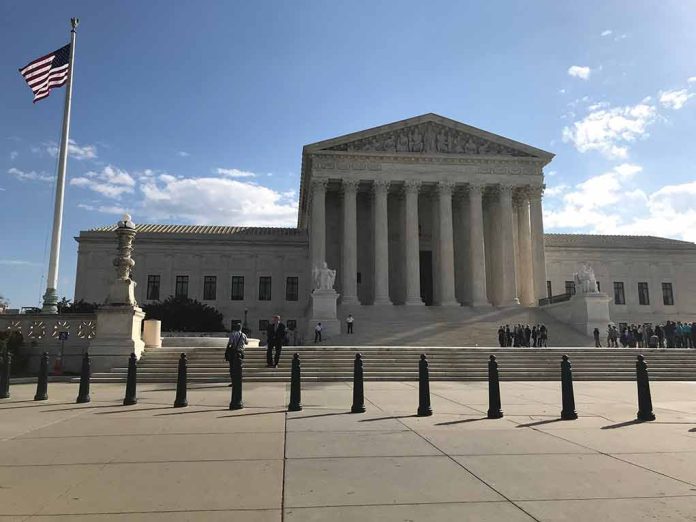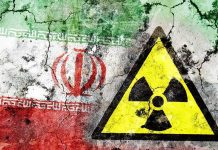
Supreme Court deals blow to privacy rights of Seattle police officers who exercised their constitutional rights to attend President Trump’s January 6 rally, forcing their names to be publicly released despite being cleared of any wrongdoing.
Key Takeaways
- The Supreme Court rejected Seattle police officers’ request for anonymity regarding their attendance at President Trump’s rally before the January 6 Capitol events
- Officers were fully cleared of any wrongdoing in internal investigations but will still face public exposure
- Justices Alito and Thomas expressed concerns about First Amendment implications but cited procedural reasons for not intervening
- The ruling highlights the ongoing tension between government transparency requirements and individuals’ rights to privacy in their political expression
- This case raises serious questions about whether public employees can be targeted for their lawful political activities
Constitutional Rights vs. Public Disclosure
In a concerning development for law enforcement officers and government employees nationwide, the Supreme Court has declined to block the release of names of Seattle police officers who lawfully attended President Trump’s January 6 rally in Washington, DC. These officers, identified only as “John Does 1, 2, 4 and 5” in court documents, sought protection from having their identities revealed following public records requests. Despite being fully cleared of any wrongdoing by the Seattle Police Department’s internal investigation, these officers now face public exposure for merely exercising their constitutional right to attend a political rally.
The case originated when a citizen named Sam Sueoka submitted public records requests seeking information about the officers who attended the rally. Although the Seattle Police Department’s investigation confirmed the officers engaged in no unlawful conduct at the Capitol, Washington state courts ultimately ruled that their names should be disclosed under public records laws. The officers argued such disclosure would violate their First Amendment rights by exposing their political beliefs and potentially subjecting them to harassment in the highly charged political climate surrounding January 6 events.
Procedural Rejection, Not Constitutional Endorsement
While the Supreme Court declined to intervene, Justices Samuel Alito and Clarence Thomas made clear this should not be interpreted as approval of the Washington state court’s constitutional analysis. In his statement on the ruling, Justice Alito emphasized that the Court’s decision was based on procedural grounds rather than an endorsement of forcing the disclosure of the officers’ identities. The officers’ emergency application failed to meet the technical requirements for Supreme Court intervention at this stage, not because their First Amendment arguments lacked merit.
“The mandate of the Washington Supreme Court was issued more than a month ago, and the applicants have not adequately explained why at this point they still face an imminent danger of irreparable harm,” said Justice Samuel Alito.
Justice Alito further criticized the Washington State Supreme Court’s reasoning, noting it failed to properly consider the officers’ constitutional claims. He pointed out that the state court improperly dismissed the officers’ privacy claims simply because they had not taken specific measures to conceal their attendance at what was a public event. This reasoning ignores established precedent protecting anonymous political expression, raising serious concerns about government employees’ rights to participate in political activities without fear of retribution.
Dangerous Precedent for Public Employees
The Supreme Court’s decision not to intervene creates a troubling precedent that could have a chilling effect on law enforcement officers and other government employees exercising their constitutional rights. The Seattle officers were cleared of any wrongdoing yet still face public exposure for their political activities conducted on their own time. This case demonstrates how public records laws can be weaponized against government employees who support conservative causes, particularly those related to President Trump.
“Our denial of review in this case should not be taken as manifesting any degree of support for the proposition that the disclosure at issue in this case is consistent with the First Amendment,” said Justice Samuel Alito.
The legal battle highlights the broader national debate over January 6 events and the ongoing attempts to penalize anyone associated with the rally, regardless of whether they participated in or even approached the Capitol. While the mainstream media continues to conflate peaceful rally attendance with the separate Capitol breach, these officers specifically were cleared of any involvement in unlawful activities. Their only “offense” was exercising their First Amendment rights to support President Trump at his “Stop the Steal” rally – a constitutional right that is supposed to be protected for all Americans, including those who work in public service.
Implications for Political Expression
This case represents a concerning intersection of public records laws and First Amendment protections that affects far more than just these officers. Justice Alito pointed to the established precedent that “the First Amendment provides a measure of protection for the right to engage in anonymous political expression.” By allowing the public identification of officers who lawfully attended a political rally, the courts have potentially created a roadmap for targeting government employees based on their political affiliations, particularly those who align with conservative causes.
“The Court’s denial of this application, however, should not be read as an endorsement of the decision below or its interpretation of the First Amendment,” he wrote. “We have held that the First Amendment provides a measure of protection for the right to engage in anonymous political expression,” said Justice Samuel A. Alito Jr.
The ruling raises profound questions about whether public employees can maintain their constitutional rights to political expression without facing professional consequences. As government agencies increasingly face pressure to expose and potentially punish employees with conservative viewpoints, this case demonstrates the urgent need for stronger protections for political expression. While transparency in government operations remains important, it should not come at the expense of individual rights to engage in lawful political activities without fear of targeting or harassment based on those beliefs.



